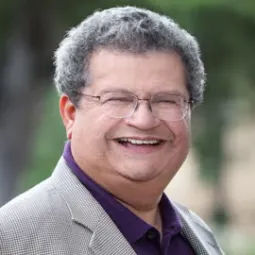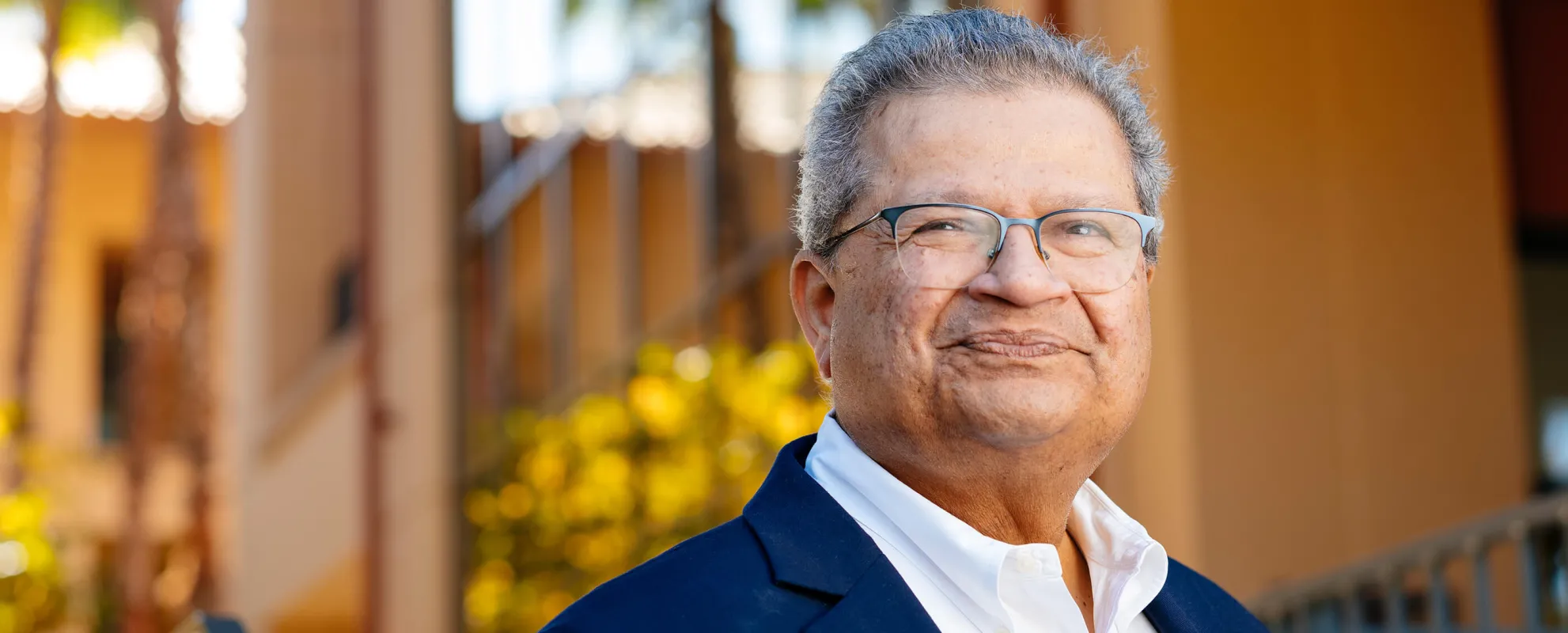Hayagreeva “Huggy” Rao is most interested in what he doesn’t yet know. So it’s not surprising that his bestselling 2014 business book, Scaling Up Excellence: Getting to More Without Settling for Less, originated in his inability to answer a student question.
At the time, Rao, a professor of organizational behavior and human resources, and Robert I. Sutton, a Stanford professor of management science and engineering, were co-teaching an executive education class on customer-focused innovation. Asked how to scale that mindset, however, they were stumped.
“We sort of said something,” Rao says, “but in retrospect both of us were profoundly dissatisfied. My recollection is we had a glass of wine, and Bob asked me, ‘What do you think of your response to that scaling question?’
“I said, ‘Mine was a terrible response. What about yours?’”
As Rao recalls the exchange, Sutton replied, “Mine was worse.”
The next step was obvious. “We did what Stanford professors do when you’re curious but clueless,” Rao says. “You immediately offer a course.”
Their students tackled such scaling challenges as encouraging helmet-wearing among student cyclists and transferring knowledge on front-line deployment among U.S. soldiers in Afghanistan. What they learned, combined with business case studies and interdisciplinary social science research, fueled Scaling Up Excellence. Among the book’s insights: Subtraction is as necessary to scaling as addition, and bad is stronger than good. “Scaling is not more of the same, but reinvention,” Rao says. A passionate foodie, he likens the process to adjusting recipes for large groups.
Rao and Sutton currently are writing a second book, on organizational friction, subtitled, “How smart leaders make the right things easy to do, the wrong things hard to do, and don’t drive people crazy.” Rao wants to call it Shit-Fixers, while Sutton prefers a more neutral title, The Friction Project.
Rao also has a book in the works with Henrich R. Greve, PhD ’94, a professor of entrepreneurship at INSEAD, a Singapore-based business school. Using computational linguistics, that book will explore the spread of online conspiracy theories about the Covid-19 pandemic.
“He Has a Bazillion Ideas”
Rao’s nickname, Huggy, doesn’t stem from his personal warmth or classroom demeanor, but from his American great-aunt. “She never could pronounce my name,” he says, “and so compressed it to ‘Huggy.’”
Born in Hyderabad, India, Rao graduated from Andhra University in 1978. He became interested in the study of organizations while working for the Tata Group, India’s largest multinational conglomerate, headquartered in Mumbai. Rao earned an MBA at India’s Xavier Labor Relations Institute and a PhD in organizational behavior at Case Western Reserve University. He describes himself as “a self-taught sociologist.”
His biggest influence, he says, was business school, where several assigned texts were written by Stanford professors. “I was a small-town boy,” he says, “and business school provided me exposure to ideas, arts and music.” At the time, he anticipated becoming a business executive. But he allowed himself to be dissuaded. “Seventy-five percent of my classmates told me that I was going to be better in academia.”
“I wish I could tell you that my career was the outcome of systematic planning and the systematic pursuit of opportunity,” Rao says. Instead, he says, it resembles “a random draw,” with his interests evolving because of people he has encountered. “To me, discovering curiosity and generosity — that’s at the heart of scholarship. I don’t like to study things I know well. I don’t like to study things I understand.”
The common thread is his interest in “how groups of people do things, how things become bigger and better,” he says. “And it doesn’t matter whether you study protests, the diffusion of innovation, or the growth of a particular mindset in a company — they’re all versions of the same issue to me. But the contexts are different. It’s like a web of ideas is being developed. Careers aren’t arrows for me. They’re webs of ideas.”
His work has touched on scaling, collective action, and social contagion, drawing on global examples and history, and both qualitative and quantitative methods. After teaching at Emory and Northwestern, he accepted an offer from the GSB in 2005. His first book was Market Rebels: How Activists Make or Break Radical Innovations (2008).
“One thing I like about Huggy is that he’s willing to try virtually anything,” says Sutton, whose own bestselling books have included Good Boss, Bad Boss and The No Asshole Rule. “Huggy’s very curious about people who are different than him — and you can see it from who he collects at Stanford, everything from the most qualitative people to the most hard-core math people.”
In their relationship, Sutton says he functions as “the adult” and “the linear one.” Sutton explains: “When something comes into his mind, he’s completely fearless about trying it, almost in mid-sentence. He has a bazillion ideas, and I reject probably 95 percent of them. But it doesn’t bother him at all! He just keeps proposing more ideas. I’m not sure he ever met an idea that he didn’t like for at least ten minutes.”
Greve has a different take. “A major source of Huggy’s impact is that he combines creative thinking with rigor,” he says. As a result, “the research can start with ideas that are different from what is commonly known or believed, and his intuition is good enough that they will be on target.”
Rao’s “willingness to learn,” Greve says, was an advantage when they collaborated with Stanford graduate students Paul Vicinanza and Echo Yan Zhou to study Covid online conspiracy theories. “We let the students,” more skilled in analyzing social media sites, “become our teachers,” Greve says. The team found that human beings, unlike bots, react to the threat of rising case counts, embrace inconsistent ideas, and adopt conspiratorial mindsets by way of more plausible “gateway” theories. The resulting article, “Online Conspiracy Groups: Micro-Bloggers, Bots, and Coronavirus Conspiracy Talk on Twitter,” has been accepted by the American Sociological Review.
The pandemic “profoundly changed my interests,” Rao says, and led to a realization: “We don’t really study the effect of what is happening in the biological environment on the cultural environment.” That notion inspired a paper, “Disgusted and Afraid: Consumer Choices Under the Threat of Contagious Diseases,” published in the Journal of Consumer Research. It showed that fearful consumers tend to gravitate to the most familiar brands and avoid those that are novel.
In the case of Covid conspiracy theorists, Rao declines to stereotype them as paranoid. Instead, he sees them, more sympathetically, as trying to “construct visions of the world to tamp down threat.” And he compares them to “bats seeking to echolocate themselves,” with the echo represented by retweets.
The friction book developed from the scaling project. “People were saying, ‘Work’s become a grind. I’m overwhelmed,’” Rao says. That led to “this simple but understudied idea” that leaders essentially were “friction fixers.” At their best, “they make the right things easy for people to do by taking bad friction out, but they make the wrong things hard for people to do by putting good friction in.”
Bad friction, such as excessive chains of approval, documentation requirements or meetings, erodes willpower, impairs decision-making ability and creates a scarcity mindset, Rao says. As an example of good friction, he cites an imaginary proposal for an academic center at Stanford that would include a liquidation date tied to the accomplishment of the center’s goal.
Rao’s current, highly popular classes at the GSB are “People Operations: From Startup to Scaleup” and “Understanding the Trends Transforming the World of Work: Lab for HR Startups,” both of which he co-teaches with Silicon Valley practitioners. That approach combines what he calls “clean models” and “dirty hands” — in the case of the people ops class, John Lilly ’93, MS ’95, a venture partner with Greylock and former Mozilla CEO, and Sujay Jaswa, founder and managing partner of WndrCo and former CFO of Dropbox.
The class’s final exam involves helping a GSB alum scale his or her company. After the graduate shares “three of their toughest people operations problems,” students are tasked with finding solutions, Rao says. “We provide a summary report of the most conventional ideas and the craziest ideas. The alum has the benefit of 70 smart people thinking for free on behalf of their company.”
“Through collision you get creativity” is one of Rao’s mantras, which he extends to food. By way of example, he recommends the recipes in Esther David’s Bene Appetit: The Cuisine of Indian Jews. Sutton says Rao is both intensely knowledgeable about the cultural meanings of food and adventurous in his culinary tastes. “He was totally into barbecued goat,” Sutton says, and kept urging his collaborator to try it. So far, Sutton reports, he has resisted.
Photos by Elena Zhukova


